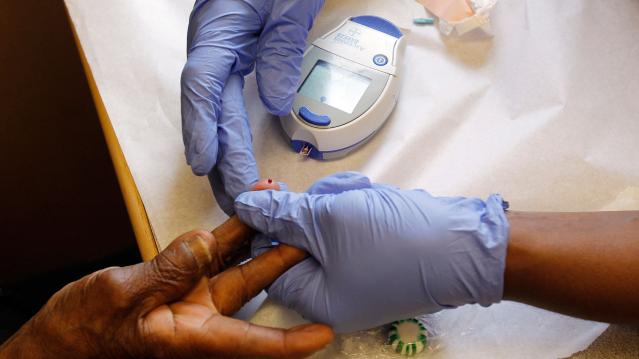This Disease Hikes Health Care Costs By More than $10,000 a Year

Medical professionals and economists have been worried about the growing prevalence of diabetes for years. A new report shows their concerns are well placed. In 2013, the per capita health care bills of consumers with diabetes was $15,000, nearly 71 percent ($10,700) higher than those without the disease, according to the Healthcare Cost Institute.
The brunt of those bills are borne by health care providers, but consumers with diabetes have per capita out-of-pocket costs of $1,922, compared to just $738 for those who do not have diabetes.
For those under the age of 65, health care expenses grew an average 4.1 percent from 2012 to 2013, but the increase was even higher among children, who saw expenses rise 7 percent from 2011 to 2012 and then another 9.6 percent from 2012 to 2013.
Related: Diabetes Detection Up in Pro-Obamacare States
“There has been extraordinary growth in health spending for children with diabetes,” HCCI senior research Amanda Frost said in a statement, citing branded insulin as one factor in the increase.
For children, the costs go beyond medication. A 2012 study in Health Affairs found that people who develop diabetes before age 30 make less money than their peers, are more likely to drop out of high school and less likely to attend college.
One of the most widespread chronic diseases in the United States, diabetes care consumes about 10 percent of U.S. health care spending, according to a study by the University of Michigan.
Increasing Number of Americans Delay Medical Care Due to Cost: Gallup

From Gallup: “A record 25% of Americans say they or a family member put off treatment for a serious medical condition in the past year because of the cost, up from 19% a year ago and the highest in Gallup's trend. Another 8% said they or a family member put off treatment for a less serious condition, bringing the total percentage of households delaying care due to costs to 33%, tying the high from 2014.”
Number of the Day: $213 Million

That’s how much the private debt collection program at the IRS collected in the 2019 fiscal year. In the black for the second year in a row, the program cleared nearly $148 million after commissions and administrative costs.
The controversial program, which empowers private firms to go after delinquent taxpayers, began in 2004 and ran for five years before the IRS ended it following a review. It was restarted in 2015 and ran at a loss for the next two years.
Senate Finance Chairman Chuck Grassley (R-IA), who played a central role in establishing the program, said Monday that the net proceeds are currently being used to hire 200 special compliance personnel at the IRS.
US Deficit Up 12% to $342 Billion for First Two Months of Fiscal 2020: CBO

The federal budget deficit for October and November was $342 billion, up $36 billion or 12% from the same period last year, the Congressional Budget Office estimated on Monday. Revenues were up 3% while outlays rose by 6%, CBO said.
Hospitals Sue to Protect Secret Prices

As expected, groups representing hospitals sued the Trump administration Wednesday to stop a new regulation would require them to make public the prices for services they negotiate with insurers. Claiming the rule “is unlawful, several times over,” the industry groups, which include the American Hospital Association, say the rule violates their First Amendment rights, among other issues.
"The burden of compliance with the rule is enormous, and way out of line with any projected benefits associated with the rule," the suit says. In response, a spokesperson for the Department of Health and Human Services said that hospitals “should be ashamed that they aren’t willing to provide American patients the cost of a service before they purchase it.”
See the lawsuit here, or read more at The New York Times.
A Decline in Medicaid and CHIP Enrollment

Between December 2017 and July 2019, enrollment in Medicaid and the Children's Health Insurance Program (CHIP) fell by 1.9 million, or 2.6%. The Kaiser Family Foundation provided an analysis of that drop Monday, saying that while some of it was likely caused by enrollees finding jobs that offer private insurance, a significant portion is related to enrollees losing health insurance of any kind. “Experiences in some states suggest that some eligible people may be losing coverage due to barriers maintaining coverage associated with renewal processes and periodic eligibility checks,” Kaiser said.


